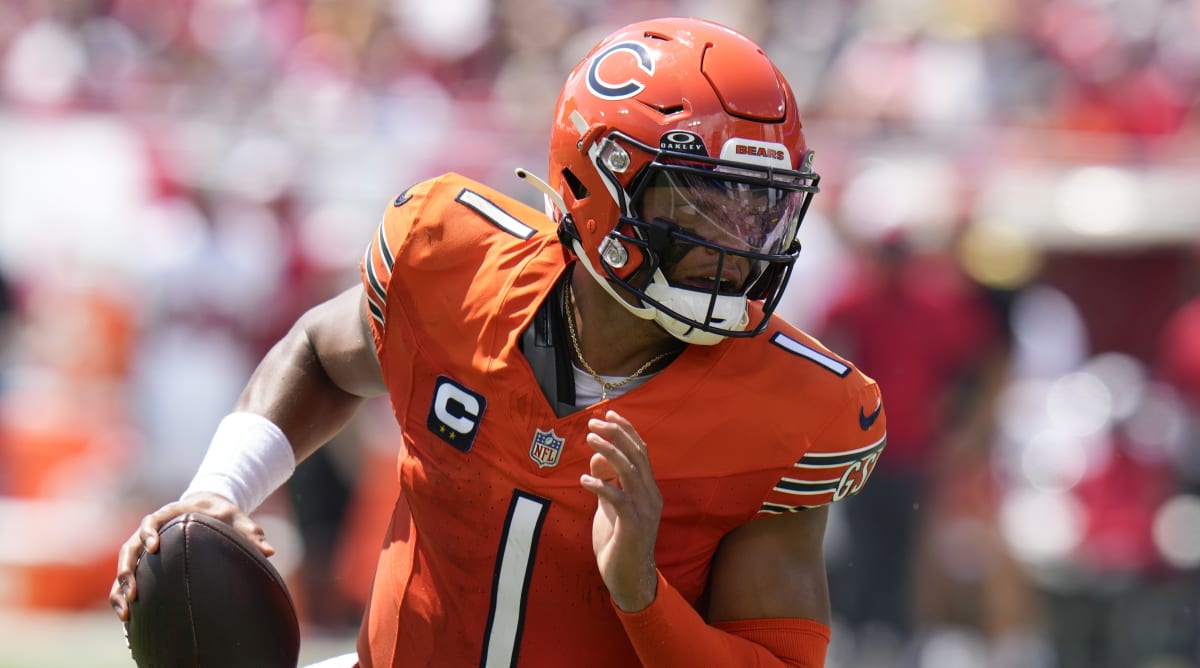What if Justin Fields wasn’t blaming the coaches, but admitting the truth about himself?
Fields described his play in the first two games as “robotic,” which shows he hasn’t purchased a good robot lately. They’re amazing! Anyway, he was asked why he has played so robotically, and this is what he said:
"You know, could be coaching, I think. At the end of the day, they are doing their job when they are giving me what to look at, but at the end of the day, I can't be thinking about that when the game comes. I prepare myself throughout the week, and then when the game comes, it's time to play free at that point. … My goal this week is just to say, ‘F it’ and go out there and play football how I know to play football. That includes thinking less and just going out there and playing off of instincts rather than so much ... info in my head, data in my head.”
When a quarterback who has won five games in 27 starts says the problem “could be coaching,” the story tends to explode—especially in Chicago, which has one of the NFL’s best fan bases and one of its worst franchises. Coaches can occasionally blame players and get away with it. But when players blame coaches, it’s always news. When the supposed-to-be-franchise quarterback does it, he might as well hand the assembled media a blowtorch, pre-lit.
And yet … if you can get past the “could be coaching” line, you have a quarterback acknowledging that he can’t play the way NFL teams have traditionally wanted their quarterbacks to play. Name one star quarterback who you can imagine saying he “can’t be thinking about” what coaches have told him because he doesn’t want “data” or “info” in his head. I thought about it for a while, and I’m still at zero.
Watch the Bears with Fubo. Start your free trial today.

Chris O'Meara/AP
Patrick Mahomes’s spatial awareness is almost unfathomable. Tom Brady and Peyton Manning couldn’t get enough information. The Panthers drafted Bryce Young first overall—with a pick they acquired from the Bears—largely because of his exceptional ability to process quickly and then execute. Whether Young succeeds or not, we’ll see. But that is why Panthers coach Frank Reich (a longtime NFL quarterback and quarterbacks coach) wanted Young.
Intelligence in sports is often oversimplified and then weaponized. There are brilliant baseball players who haven’t read a book without pictures in it in years. There are Nobel Prize-winning scientists who would be absolutely awful at reading NFL defenses in real time (though they could probably write excellent papers on the impossibility of a human being able to make “all the throws.”)
So none of this is a judgment of Fields’s intelligence. It’s an observation of his football skill set. When Fields played at Ohio State, he obviously had the arm to be an NFL starter. In an incredible performance against Clemson in the College Football Playoff, he showed he also had the toughness. But he had so much time to throw to so many incredibly gifted (and therefore open) receivers that it was hard to know if his skills would translate to the NFL, where he would never enjoy the kind of talent advantage that Ohio State had in almost every game.
Was Ohio State hiding his weaknesses—or hiding his strengths?
Both, as it turns out. The Buckeyes did not ask him to run much, leading to questions about whether he was capable of using his obvious footspeed in game action. Well, last year, Fields ran for 1,143 yards on just 160 carries. That answers that.
But in two-plus NFL seasons, Fields has taken sacks at almost twice the rate he did at Ohio State. He has not shown the ability to execute passing plays quickly, decisively and consistently. He is not, and will almost certainly never be, a classic pick-you-apart pocket passer.
If the Bears still expect that, they are fooling themselves—and limiting one of the great running quarterbacks of all time.
Fields is a dynamic player. If he has any chance to be a successful quarterback, he needs a team to understand what he is and what he isn’t. Take advantage of his running. Use it to put pressure on the defense. Give him the kind of low-risk passing plays that he can execute with confidence. Maybe the league would figure it out and stop him. But it would give Fields his best chance at success.
Put aside the way he phrased it. Justin Fields just told the Bears who he is. Maybe they should believe him.







